In a conference room in the heart of Tel Aviv, a blizzard of languages from across the world fills the air – French, Hebrew, Arabic, Tigrinya, and HTML.
The new initiative launched just two weeks ago with an ambitious goal: to teach coding, from HTML and CMS to Java Script, to a very specific part of Israeli society – refugees.
The program is the result of a collaboration between the Developers Institute (DI), a coding-focused bootcamp on Ahad Ha’am street in Tel Aviv, and the African Refugee Development Center (ARDC), a Tel Aviv-based nonprofit organization founded in 2004 by African asylum seekers and Israeli citizens.
SEE ALSO: Seven Israeli Companies Selected To Head State-Funded Coding Bootcamps
Inside the institute, a lively, immersive space hosting a number of classes and initiatives, people of different nationalities chat in corridors, rush to classes or conferences, or grab a snack in the break room. Amid a severe shortage of developers and software engineers which will negatively impact the Israeli tech sector and the general economy, they are all here to acquire in-demand skills they hope will set them on a new professional path.
The three-month program currently has 12 students and runs bi-weekly on Monday and Thursday evenings.
Refugees in Israel
Israel is home to some 38,000 refugees and asylum seekers from African countries, a majority from Eritrea and Sudan, according to a January 2018 report. Many fled war and brutal dictatorships, arriving in Israel after long, perilous journeys. But the country has not welcomed them with open arms, and by-and-large considers them economic migrants looking for work opportunities, with many Israeli officials referring to them as “infiltrators.”
Many have lived in the country for years, a great majority in south Tel Aviv. With temporary visas they must renew every few months, they face difficult realities and limited job prospects. Out of thousands of applications for asylum, Israel has recognized status for one Sudanese man and 10 Eritreans, with an acceptance rate of 0.056 percent, according to the Hotline for Refugees and Migrant Workers.
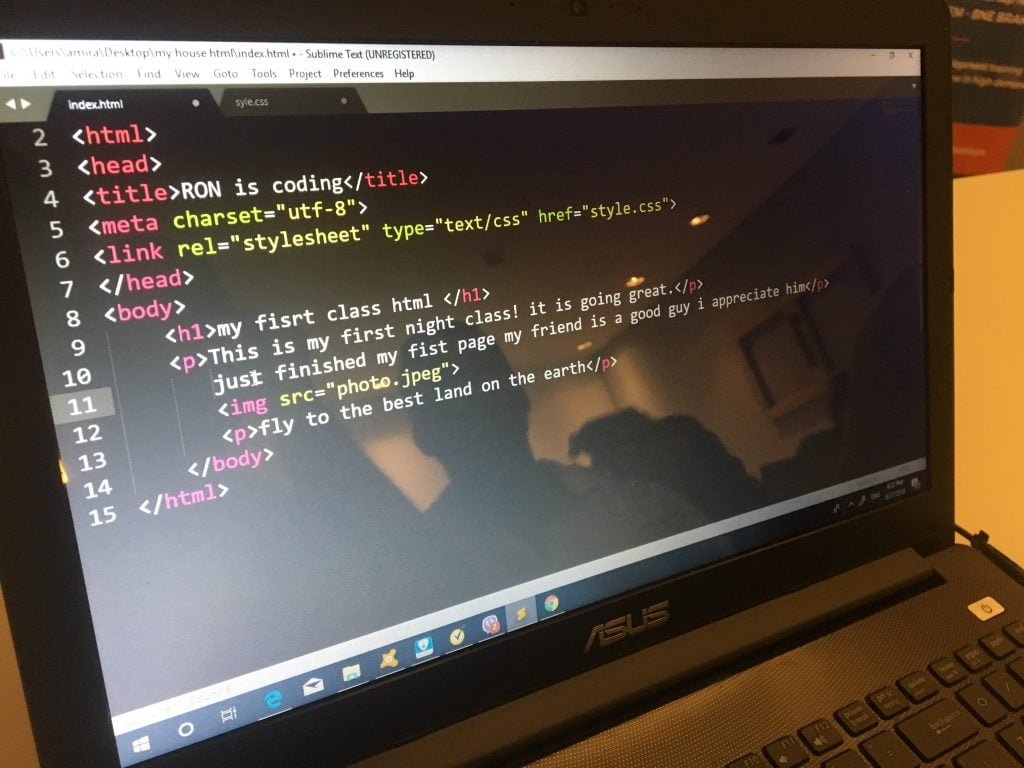
Coding class. Developers Institute courtesy
Because of their uncertain status, most take menial jobs in the food/restaurant service, hospitality, construction, and cleaning, where they earn no social benefits and are at risk of mistreatment.
In this context, the coding program by the Developers Institute seeks to reconcile the difficult reality they face with a real, existing gap in the job market, looking to integrate them into the workforce and pursue tech-focused careers.
The initiative is the brainchild of ARDC’s Leah Hecht, the director of operations and strategy, and Gabriel Bell, the livelihoods coordinator, and Kfitzah, a nonprofit organization that seeks to empower local underrepresented communities in Tel Aviv through technology education. Over the past few months, they have been looking into opportunities that refugees access to coding and programming education, forging the collaboration with DI to launch the initiative.
“We launched this program to ensure that refugees living in South Tel Aviv could gain access to further job opportunities. Our goal is to provide them with the tools to find fulfilling, rewarding jobs, as well as a launching pad for the future,” says Oz Kilim, a new immigrant to Israel from the UK who works as a higher education coordinator at ARDC and project manager at DI, and who helped launch the program.
Elhadi Mussa Suilman Nimmer, a Sudanese refugee currently enrolled in the program, says: “I first came to Israel, as my country was severely affected by war and civil unrest. By joining this program, I wanted to further develop my professional skills, without having to invest numerous years into attaining specific pieces of knowledge. I see this program as a pathway to greater professional endeavors,”
Awet Kebedom, a refugee from Eritrea, highlighted in an interview his difficult journey to Israel, as well as the re-assuring possibilities that could spring from this course.
“I arrived in Israel from Eritrea ten years ago, where I completed a BA degree in accounting. My journey took me through Sudan, Libya, and the Sahara desert, which I crossed thinking that I would then head to Europe. Ultimately, I opted for Israel as my final destination, yet my current status here is still unclear.”
A graphic designer who expressed true joy in partaking in this initiative, he added “when I heard of this program, I did not hesitate to join. I am passionate about working in front of computers and I thought this could be an enjoyable experience, leading to greater things.”
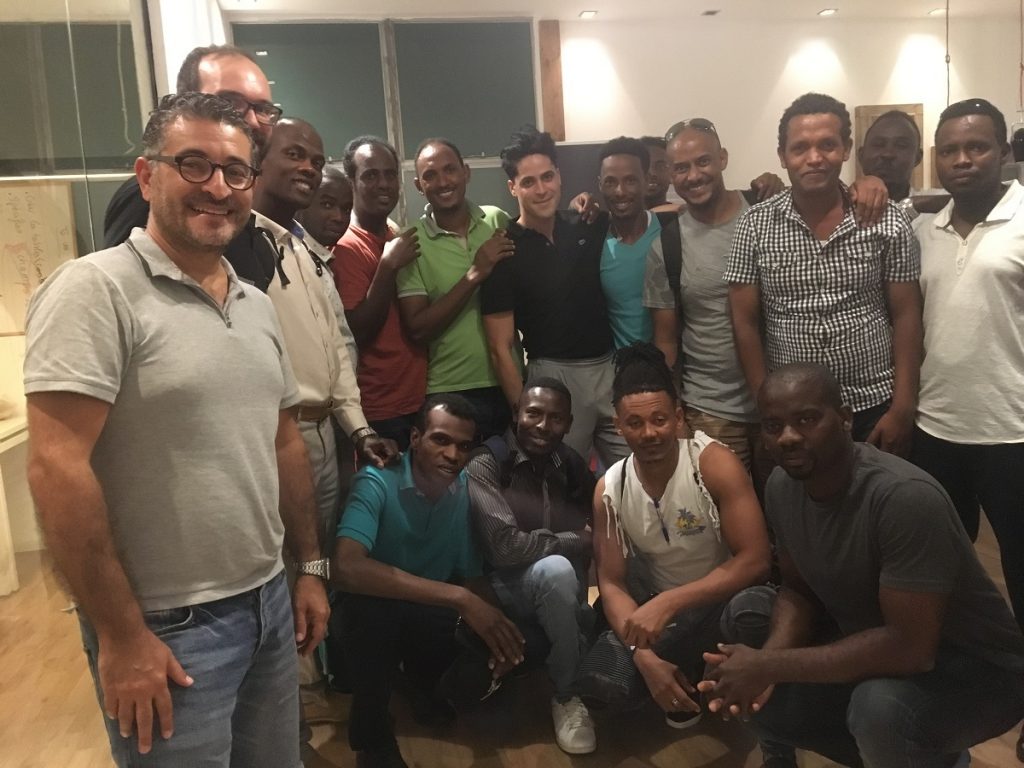
Coding program for refugees at The Developers Institute. Courtesy
Students attending the course were introduced to it through the ARDC, which is subsidizing the program together with the Developers Institute.
Sign up for our free weekly newsletter
SubscribeCo-founded in 2017 by Mégane Dreyfuss and Jerome Avner Maman, the Developers Institute has an array of programs for those looking to get acquainted with web and mobile development, or professionals seeking to deepen their knowledge. This includes a four-month program that combines web development and Torah studies – making for an interesting religions-tech platform – intensive coding bootcamps for students of different levels and different ages, as well as iOS development- and WordPress-focused courses.
“The Developers Institute was founded on the idea of creating a community and the notion that anyone can be a developer, no matter the nationality, religion, social extraction or upbringing,” says Dreyfuss.
“Together with the ARDC we launched this specific course because we wanted to give refugees the opportunity to become developers. The best-performing student will actually receive a full scholarship and be able to join one of our intensive bootcamps cost-free,” she adds.
An uncertain professional future
ARDC says refugees can actually be hired by tech companies and become fully integrated into the working landscape, while also pursuing gainful freelance careers.
“We are happy to facilitate the process of hiring refugees. We have in fact successfully placed two refugees in a high-tech company and received great feedback on their professional performance,” Hecht tells NoCamels.
“Companies are not aware of existing clear-cut legal frameworks that enable refugees to fully dive into specific positions in the country,” Kilim says. “In this context, we are actively looking to connect refugees with startups and draw awareness to the extraordinary potential of hiring them. Their abilities, dedication, and commitment can ensure excellent results for the employing companies,” he adds.
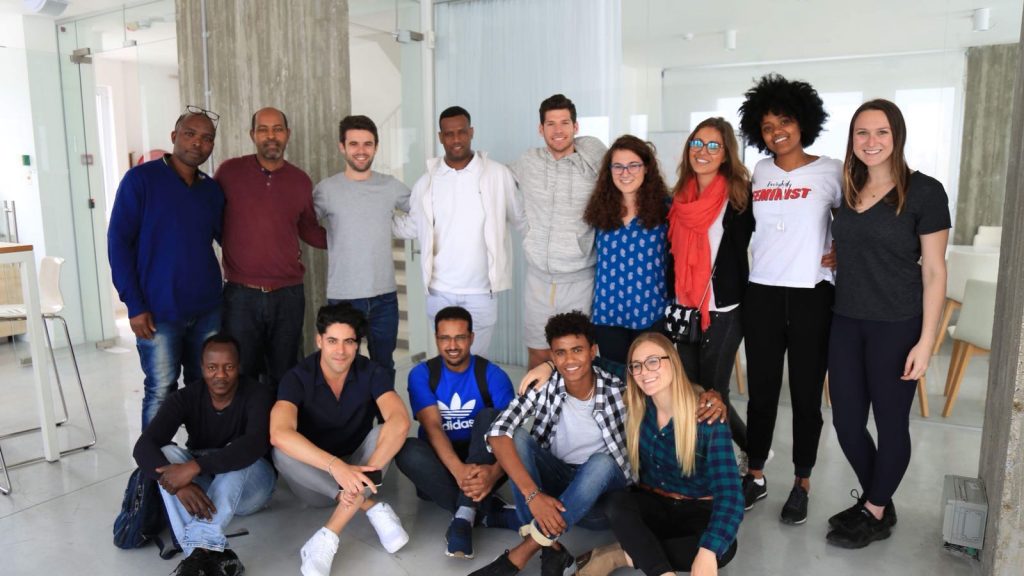
Introduction to Coding Initiative with Kfitzah, February 2018. Courtesy
But the future is full of uncertainties. Requests to renew temporary visas can be denied, and asylum applications may continue to be ignored, leaving thousands in ongoing limbo. As of February 2018, the Times of Israel reported, only 200 Sudanese people in Israel received an A5 humanitarian visa, which entails a partial recognition of refugee status and enables them to work legally.
Israel had also embarked on a controversial, aggressive campaign of “willing deportation” of African refugees and asylum seekers, coercing them to agree to leave to a third-party country in exchange for money. The plan is currently on the back-burner after it was met with fierce criticism from around the world.
Inroads to integration
Earlier this year, significant efforts were launched to begin integrating some underrepresented sectors of Israeli society, namely Arab and Ultra-Orthodox communities, in the tech sector. Last month, a coalition of Israeli NGOs, high-tech companies, philanthropists and government leaders, put together by the non-profit Start-Up Nation Central (SNC), kicked off a new program to train computer science graduates from both communities for future work in the high-tech industry.
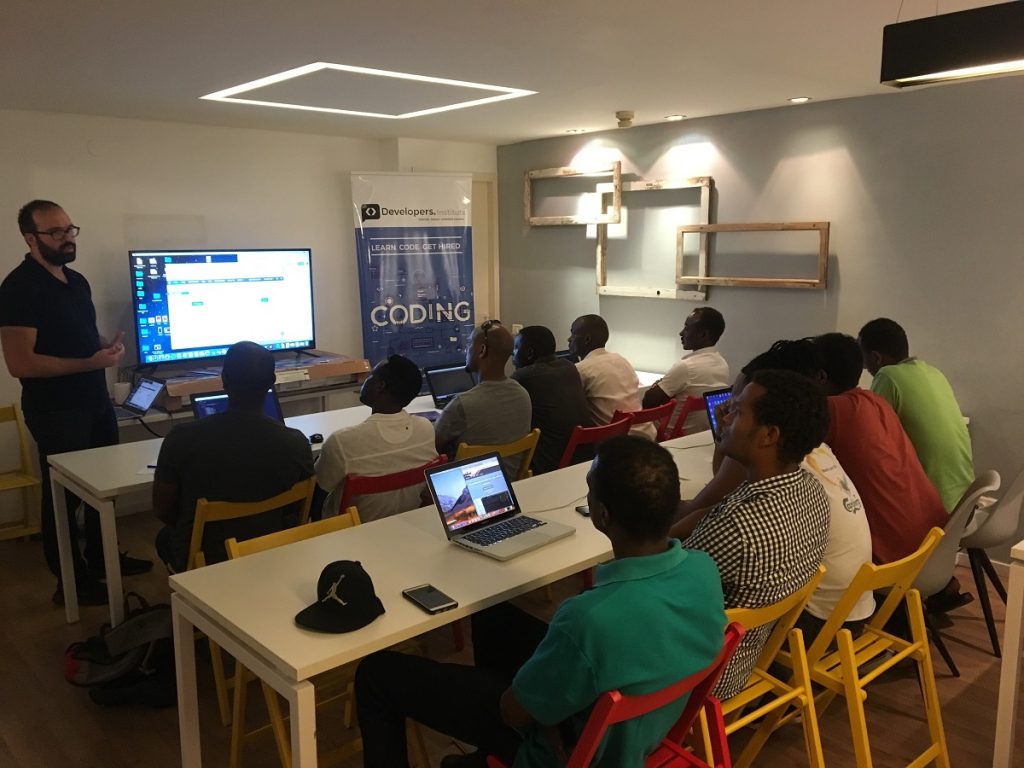
Coding program for refugees at The Developers Institute. Courtesy
Dubbed Excellenteam, it is based in Jerusalem and will provide “hands-on technical training, experience in problem-solving, exposure to the industry, help in developing soft skills, and assistance in finding relevant placements in tech companies.”
Hecht says Excellenteam and ARDC are now in the initial process of mapping out potential opportunities for future collaboration.
The subject of refugees and asylum seekers remains contentious and heated, especially on the government level. This coding program for refugees in Tel Aviv lays the groundwork for some inclusion and hopeful economic opportunities for a disadvantaged minority.
UPDATE: This article was edited to add a quote from ARDC’s Director of Operations and Strategy Leah Hecht, and to mention initial talks with Excellenteam.
Ricky Ben-David contributed to this report.
Related posts

Editors’ & Readers’ Choice: 10 Favorite NoCamels Articles

Forward Facing: What Does The Future Hold For Israeli High-Tech?

Impact Innovation: Israeli Startups That Could Shape Our Future


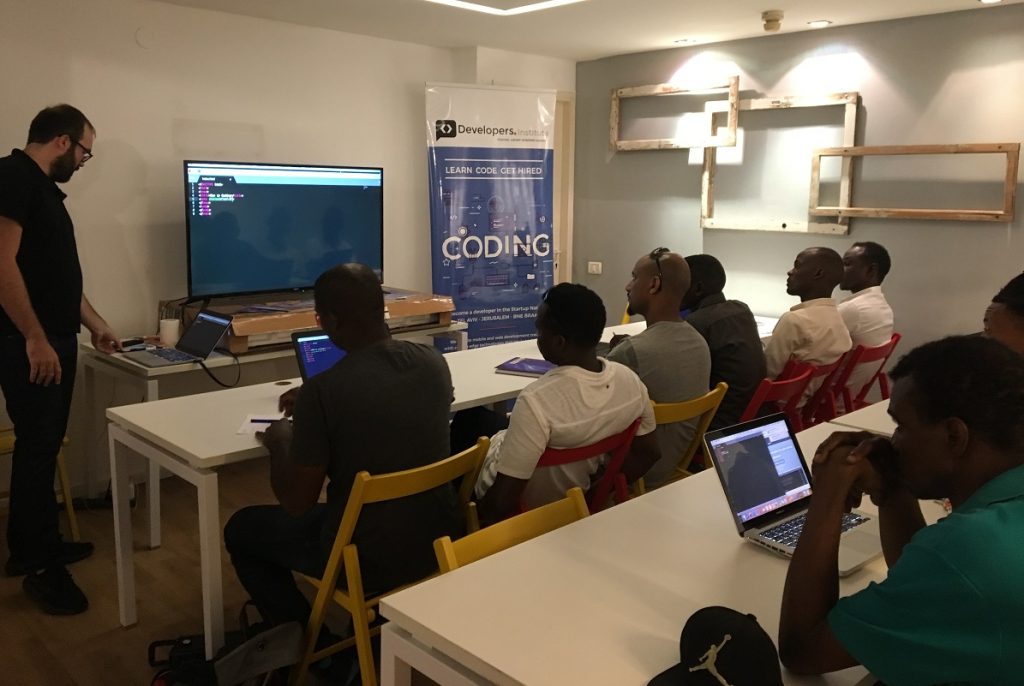

Facebook comments